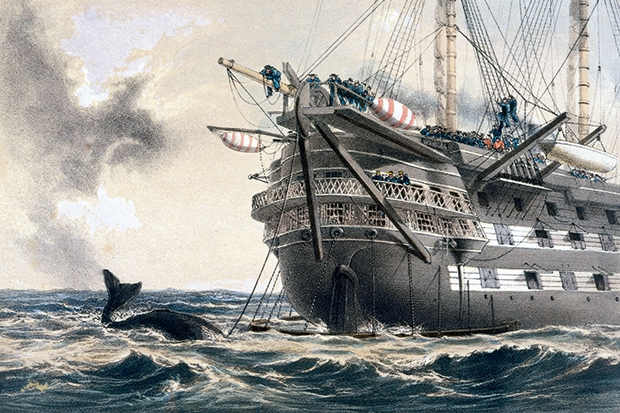We can all identify decades in which the world moved forward. Wars are not entirely negative experiences: the social and technological advances of the 1910s and 1940s are obvious. Ben Wilson has been more thoughtful, and has chosen the 1850s — or, more specifically, the years from 1851 to 1862. It was a time when, as he says, Britain was at the peak of her power. The empire was not at its greatest — the Scramble for Africa had yet to occur — but Germany had not unified, and America was economically overdependent on slavery and, not least because of that abomination, about to fall into civil war.
Wilson describes the Great Exhibition of 1851 as a showcase of Britain’s manufacturing might, when it was truly ‘the workshop of the world’. He makes the shrewd observation that what was not displayed by foreign countries was more interesting than what was: these were the inventions that would in time relegate Britain in the list of powers. One story Wilson does not tell was about the American screw manufacturer who revolutionised the way screws were made. His UK patent was bought by Joseph Chamberlain’s uncle, who within a decade or so had put out of business most of the screw-makers of Birmingham, and created the fortune that funded Radical Joe’s career in politics.
The world became smaller. Wilson relates how clippers — so termed because of the time they cut off sea voyages — allowed news and goods to be taken around the world in record time. The invention of the telegraph enabled Julius Reuter to make his fortune (and traders to make killings) and set up his news business. The invention of the hard, rubber-like substance gutta percha — a commodity forgotten now, but revolutionary then — enabled cabling to be insulated and encased, and to join Britain, telegraphically, to the Continent, and after 1858 to North America. Laying the cable from Valentia Island, off the coast of Co. Kerry, to Newfoundland was a miracle of naval engineering: that it stopped working within a month and proved difficult in the extreme to repair was another matter.
Wilson also looks at newspapers, and how they reported and sensationalised news, involving people on all continents in national and international affairs as never before. The Times’s reports of the Crimean War in 1854–55 were instrumental in bringing down Aberdeen’s government and replacing it with Palmerston’s, which quickly revolutionised the conduct of warfare, not least by building the first military railway. The advent of photography, as well as speedy transmission of news, brought distant events close to home, and increased critical interest in them.
The 1850s were also a time of British activity and trade in China, but in the face of growing resistance by the Chinese against imperial aggression. The Indian mutiny of 1857 altered Britain’s relationship with the subcontinent, and left a legacy of distrust that would pertain for the remaining 90 years before independence. The behaviour of many states of America towards slaves (and, indeed, American Indians) was, however, far worse than anything the Raj did to its subject peoples in India.
Wilson writes well of the expansion of America westward, at its peak in the 1850s: but ‘King Cotton’, which relied on slave labour for profitability, wanted newly annexed territories to allow slavery (this is a quarter of a century after its abolition in the British empire): the northern states did not. The two cultures could not survive in one state, and the civil war was an inevitability. The lesson was not learned as quickly as it might have been, with America’s blacks waiting another century before the Civil Rights Acts allowed them to live like any other human being. Wilson is good on the lengths to which European governments went to try to end the war, fearing a catastrophic effect on trade.
He reminds us how much of the world still had to be opened up in the 1850s: not just America’s west, but also parts of Australia that experienced their own gold rush. He tells superbly the story of the panic-stricken hopefuls who struggled to reach the goldfields — panicking because in the time it took to get there they feared others were discovering all the gold — only to find ruination and destitution. Australia was remarkably like the Wild West, though it civilised quickly.
This is a scholarly, intelligent and readable book. Whether Wilson’s thesis — that the 1850s marked the advent of modernity — entirely stands up is debatable. Free trade, which he holds, rightly, to have been so significant, came not least as a result of the repeal of the Corn Laws in 1846, one of many remissions of duties in that decade. And the big lesson of democracy came in the Reform Act of 1867, a lesson absorbed far beyond Britain. But this book is an original prism through which to view the mid-19th century and, essentially, about the invention not so much of modernity as of globalisation.






Comments